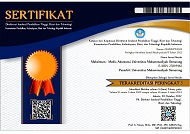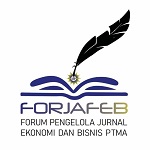Does tax aggressiveness and capital structure affect firm performance? The moderating role of political connections
(1) Universitas Esa Unggul
(2) UIN Syekh Ali Hasan Ahmad Addary
(*) Corresponding Author
Abstract
This study examines how company performance affects tax aggressiveness, capital structure, and political connections. In addition, we also examine whether political connections moderate the effect of tax aggressiveness and firm performance, as well as capital structure and firm performance. Companies with aggressive tax strategies where they are politically connected perform better than vice versa. In addition, companies with larger external capital structures perform better when the company's boards are politically connected. In order to avoid the disadvantages of an aggressive tax strategy and a high external political model structure, the Company builds connections through the board to obtain projects from the government and avoid the risk of oversight by the authorities. Therefore, we suggest that regulators conduct inspections and supervision of companies that have political connections through the board to use unconstitutional methods to obtain projects from the Government or other benefits. In addition, we recommend that shareholders carefully carry out oversight in the context of overcoming agency problems in companies that are politically connected.
Keywords
Full Text:
PDFReferences
Azizah, F., & Amin, M. Al. (2020). Pengaruh Koneksi Politik Terhadap Kinerja Perusahaan. Indonesian Journal of Accounting and Governance, 4(1), 1–17.
Berger, A. N., & Bonaccorsi, E. (2006). Capital structure and firm performance : A new approach to testing agency theory and an application to the banking industry q. 30, 1065–1102. https://doi.org/10.1016/j.jbankfin.2005.05.015
Caroline, H. I., Minarso, B., & Nurcahyono, N. (2023). Determinan Opini Audit Going Concern : Studi Kasus Perusahaan Sektor Industri Barang Konsumsi. 7(1). https://doi.org/10.18196/rabin.v7i1.17082
Chen, S., Chen, X., Cheng, Q., & Shevlin, T. (2010). Are family firms more tax aggressive than non-family firms? Journal of Financial Economics, 95(1), 41–61. https://doi.org/10.1016/j.jfineco.2009.02.003
Choi, J., & Park, H. (2022). Tax Avoidance, Tax Risk, and Corporate Governance: Evidence from Korea. Sustainability (Switzerland), 14(1). https://doi.org/10.3390/su14010469
Chung, H., Sonu, C. H., Zang, Y., & Choi, J.-H. (2019). Opinion Shopping to Avoid a Going Concern Audit Opinion and Subsequent Audit Quality. AUDITING: A Journal of Practice & Theory, 38(2), 101–123. https://doi.org/10.2308/ajpt-52154
Cook, K. A., Moser, W. J., & Omer, T. C. (2017). Tax Avoidance and Ex Ante Cost of Capital. https://doi.org/10.1111/jbfa.12258
Desai, M. A., & Dharmapala, D. (2006). Corporate tax avoidance and high-powered incentives. Journal of Financial Economics, 79(1), 145–179. https://doi.org/10.1016/j.jfineco.2005.02.002
Dewanta, M. A., & Machmuddah, Z. (2019). Gender, Religiosity, Love of Money, and Ethical Perception of Tax Evasion. Jurnal Dinamika Akuntansi Dan Bisnis, 6(1), 71–84. https://doi.org/10.24815/jdab.v6i1.10990
Drake, K. D., Lusch, S. J., & Stekelberg, J. (2019). Does Tax Risk Affect Investor Valuation of Tax Avoidance? Journal of Accounting, Auditing and Finance, 34(1), 151–176. https://doi.org/10.1177/0148558X17692674
Dyreng, S. D., Hanlon, M., & Maydew, E. L. (2008). Long-run corporate tax avoidance. Accounting Review, 83(1), 61–82. https://doi.org/10.2308/accr.2008.83.1.61
Dyreng, S. D., Hoopes, J. L., & Wilde, J. H. (2016). Public Pressure and Corporate Tax Behavior. Journal of Accounting Research, 54(1). https://doi.org/10.1111/1475-679X.12101
Faccio, M., Dinç, S., Djankov, S., Fisman, R., Giannetti, M., Green, R., Gresik, T., Kim, E. H., Lasfer, M., Masulis, R., Mauro, P., Mcconnell, J., Mitton, T., Morck, R., Parsley, D., Rose-Ackerman, S., Schultz, P., Shleifer, A., & Stolin, D. (2010). Faccio2010 - Differences between Politically Connected and Nonconnected Firms_A Cross‐Country Analysis.pdf. Financial Management, 1, 905–927.
Fathony, R., & Syarifudin. (2021). Pengaruh Struktur Modal Terhadap Profitabilitas dengan Ukuran Perusahaan Sebagai Variabel Moderasi ( Studi pada Perusahaan dalam Indeks JII Periode 2017-2019 ). Jurnal Imiah Ekonomi Islam, 7(03), 1347–1356.
Fauzi, R. A., Achsani, N. A., Andati, T., & Anggraeni, L. (2022). Finance & Banking Studies The Effect of Capital Structure on Telecommunication Firm Performance : An International Evidence. International Journal of Finance & Banking Studies, 11(2), 98–108.
Gill, A. (2011). The effects of capital structure on profitability : Evidence from United States The Effect of Capital Structure on Profitability : Evidence from the United States. The Effect of Capital Structure on Profitability: Evidence from the United States, January 2011.
Goh, B. W., Lee, J., Lim, C. Y., & Shevlin, T. (2016). The effect of corporate tax avoidance on the cost of equity. Accounting Review, 91(6), 1647–1670. https://doi.org/10.2308/accr-51432
Guenther, D. A., Matsunaga, S. R., & Williams, B. M. (2017). Is tax avoidance related to firm risk? Accounting Review, 92(1), 115–136. https://doi.org/10.2308/accr-51408
Hanlon, M., & Heitzman, S. (2010). A review of tax research. Journal of Accounting and Economics, 50(2–3), 127–178. https://doi.org/10.1016/j.jacceco.2010.09.002
Hanlon, M., & Slemrod, J. (2009). What does tax aggressiveness signal? Evidence from stock price reactions to news about tax shelter involvement. Journal of Public Economics, 93(1–2), 126–141. https://doi.org/10.1016/j.jpubeco.2008.09.004
Hasan, I., Hoi, C. K. (Stan), Wu, Q., & Zhang, H. (2014). Beauty is in the eye of the beholder: The effect of corporate tax avoidance on the cost of bank loans. Journal of Financial Economics, 113(1), 109–130. https://doi.org/10.1016/j.jfineco.2014.03.004
Inger, K. K. (2014). Relative Valuation of Alternative Methods of Tax Avoidance. American Accounting Association, 36(1), 27–55. https://doi.org/10.2308/atax-50606
Junaidi, R. R., & Siregar, S. V. (2020). The effect of political connection and earnings management on management compensation. International Journal of Business and Globalisation, 26(1–2), 92–118. https://doi.org/10.1504/IJBG.2020.109828
Khuong, N. V., Liem, N. T., Thu, P. A., & Hong, T. (2020). Cogent Business & Management Does corporate tax avoidance explain firm performance ? Evidence from an emerging economy Does corporate tax avoidance explain firm performance ? Evidence from an emerging economy. Cogent Business & Management, 7(1). https://doi.org/10.1080/23311975.2020.1780101
Khwaja, A. I., & Mian, A. (2005). Do Lenders Favor Politically Connected. The Quarterly Journal of Economics, 120(4), 1371–1411.
Kristanto, A. T. (2019). Pengaruh Political Connections Terhadap Kinerja Perusahaan. EXERO Journal of Research in Business and Economics, 02(01), 1–21.
Lanis, R., & Richardson, G. (2011). The effect of board of director composition on corporate tax aggressiveness. Journal of Accounting and Public Policy, 30(1), 50–70. https://doi.org/10.1016/j.jaccpubpol.2010.09.003
Mai, M. U., & Setiawan. (2020). Pengaruh Struktur Modal Terhadap Kinerja Perusahaan Pada Industri Manufaktur Kriteria Syariah Di Bursa Efek Indonesia. Jurnal Riset Akuntansi Dan Keuangan, 8(1), 159–170.
Mustika, M., Sulistyowati, S., & Wahyuni, E. N. (2020). Examining the Impact of Liquidity, Leverage and Earning Management on Corporate Tax Aggressiveness in Property and Real Estate Companies on Indonesia Stock Exchange. Advances in Economics, Business and Management Research, 127(Aicar 2019), 2014–2017. https://doi.org/10.2991/aebmr.k.200309.022
Ngatno, Apriatni, E. P., & Youlianto, A. (2021). Moderating effects of corporate governance mechanism on the relation between capital structure and firm performance. Cogent Business and Management, 8(1). https://doi.org/10.1080/23311975.2020.1866822
Ningsih, S., & Utami, W. B. (2020). Pengaruh Operating Leverage dan Struktur Modal terhadap Kinerja Keuangan pada Perusahaan Go Publik Sektor Property Dan Real Estate. Jurnal Akuntansi Dan Pajak.
Nurcahyono, N., Hanum, A. N., Kristiana, I., & Pamungkas, I. D. (2021). Predicting fraudulent financial statement risk: The testing dechow f-score financial sector company inindonesia. Universal Journal of Accounting and Finance, 9(6), 1487–1494. https://doi.org/10.13189/ujaf.2021.090625
Nurcahyono, N., Sukesti, F., & Haerudin, H. (2022). The Effect of Good Corporate Governance Mechanisms, Financial Ratio, and Financial Distress: A Study on Financial Companies. https://doi.org/10.4108/eai.10-8-2022.2320848
Pattiruhu, J. R., & Paais, M. (2020). Effect of Liquidity , Profitability , Leverage , and Firm Size on Dividend Policy. Journal of Asian Finance, Economics and Business, 7(10), 35–42. https://doi.org/10.13106/jafeb.2020.vol7.no10.035
Richardson, G., Taylor, G., & Lanis, R. (2013). The impact of board of director oversight characteristics on corporate tax aggressiveness: An empirical analysis. Journal of Accounting and Public Policy, 32(3), 68–88. https://doi.org/10.1016/j.jaccpubpol.2013.02.004
Ritonga, S. A., Effendi, I., & Prayudi, A. (2021). Jurnal Ilmiah Manajemen dan Bisnis ( JIMBI ) Pengaruh Struktur Modal Terhadap Kinerja Keuangan Perusahaan Consumer Goods di BEI The Effect of Capital Structure on the Financial Performance of Consumer Goods Companies on the BEI. Jurnal Ilmiah Manajemen Dan Bisnis, 2(2), 86–95. https://doi.org/10.31289/jimbi.v2i1.383
Sukesti, F., Ghozali, I., Fuad, F., Almasyhari, A. K., & Nurcahyono, N. (2021). Factors Affecting the Stock Price: The Role of Firm Performance. Journal of Asian Finance, Economics and Business, 8(2), 165–173. https://doi.org/10.13106/jafeb.2021.vol8.no2.0165
Sulistyowati, N., & Prabowo, T. J. W. (2020). Pengaruh Koneksi Politik Terhadap Kinerja Lingkungan dan Profitabilitas. Diponegoro Journal of Accounting, 9(53), 1–15.
Sunengsih, L., Iskandar, & Kusumawardani, A. (2021). Pengaruh tax avoidance , keputusan investasi dan kebijakan dividen terhadap nilai perusahaan The effect of tax avoidance , investment decisions and dividend policy on firm value. Kinerja, 18(4), 628–633.
Tangngisalu, J., Hasanuddin, R., & Hala, Y. (2020). Effect of CAR and NPL on ROA : Empirical Study in Indonesia Banks. Journal of Asian Finance, Economics and Business Vol, 7(6), 9–18. https://doi.org/10.13106/jafeb.2020.vol7.no6.009
Utamaningsi, L. (2020). Perusahaan Keluarga, Koneksi Politik & Kinerja Perusahaan. Jurnal Ilmiah Universitas Batanghari Jambi, 20(1), 68–73. https://doi.org/10.33087/jiubj.v20i1.840
Velnampy, T. (2014). Capital Structure , Liquidity Position and Their Impact on Profitability : A Study of Listed Telecommunication Firms in Colombo Stock Exchange ( CSE ), Sri Lanka. Research Journal of Finance and Accounting, 5(9), 131–140.
Yan, J. Z., & Chang, S.-J. (2018). The Contingent Effect of Political Strategies on Firm Performance: A Political Network Perspective. Strategic Management Journal. https://doi.org/10.1002/smj.2908
Zhang, H., Wang, M., & Jiang, J. (2017). Investor Protection and Stock Crash Risk. Pacific-Basin Finance Journal. https://doi.org/10.1016/j.pacfin.2017.05.001
Article Metrics
Abstract view : 216 timesPDF - 6 times
DOI: https://doi.org/10.26714/mki.13.1.2023.39-49
Refbacks
- There are currently no refbacks.
-----------------------------------------------------------------------------------------------------------------------------------------------------------------------------------
 | MAKSIMUM: Media Akuntansi Universitas Muhammadiyah Semarang |
![]()
Maksimum: Media Akuntansi Universitas Muhammadiyah Semarang is licensed under a Creative Commons Attribution Attribution-NonCommercial-NoDerivatives 4.0 International License.

















